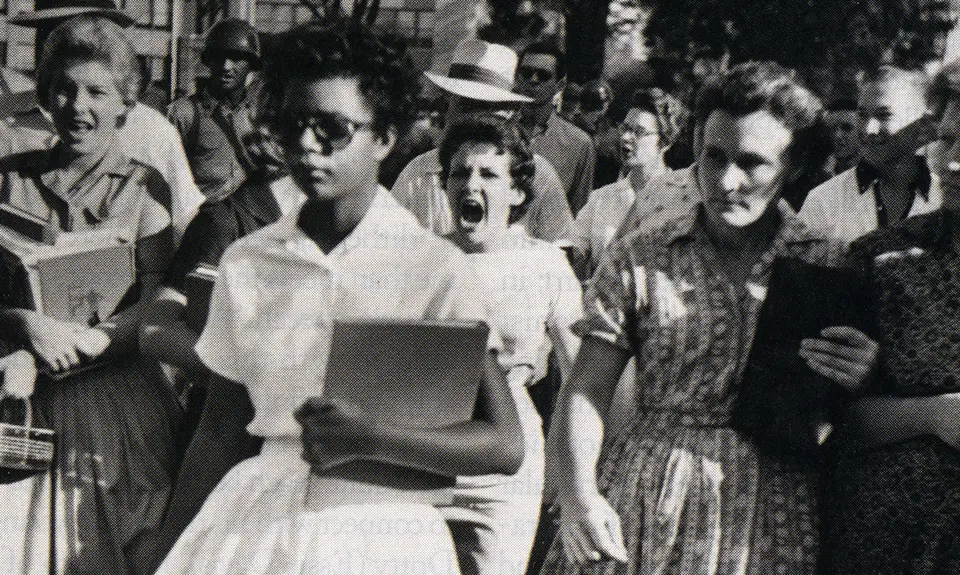The old saying goes, “those who forget history are doomed to repeat it.” Well, some people today are certainly learning the wrong lessons from the past.
On September 27, 1958, voters in Arkansas—spurred on by an extremist governor and groups like the Mothers’ League of Central High School—decided to keep four public schools closed for an entire school year rather than allow children of all races to learn together, in accordance with the Constitution. Today, organizations like Moms for Liberty and governors like Ron DeSantis are banning books about the experiences of people of color and LGBTQ individuals and trying to deny students the right to learn. The common thread is the manipulation of education by extremists to further authoritarian goals.
Arkansas Denied Its Own Students the Opportunity to Learn
After the 1954 Brown v. Board of Education decision, US schools were ordered to desegregate “with all deliberate speed.” The Little Rock, Arkansas, school board initially planned to integrate its first schools during the 1957-58 school year, but when a group of Black students arrived, known now as the Little Rock Nine, they were met with aggression and violence from white protestors. The resistance was so intense that the National Guard had to be called in to escort the students.
The governor of Arkansas, fueling the protests and discrimination, attempted to push back desegregation until 1961. But after the NAACP appealed, the Supreme Court ruled that Little Rock must integrate. However, while awaiting a decision by the Court, the Arkansas legislature passed a law allowing the governor to close public schools in emergencies and later seek public support through a special election to determine whether schools should remain closed—and that’s exactly what Arkansas did in response to the order to integrate. Immediately after the Court’s ruling, four public high schools were closed, and on September 27, 1958, voters in Arkansas chose to keep schools closed rather than desegregate. The schools remained closed for the entire school year.
While political actors like the governor played strong parts, it was ultimately the people of Arkansas, egged on by groups like the Mothers’ League and the Capital Citizens’ Council, who voted to close schools rather than integrate. It was a dark chapter in history that shows just how far the extremists in our midst will go to deny and destroy education.
All Students Lose in the War on Education
We’re seeing parallels today. Groups like Moms for Liberty are riling up their extremist followers to ban books and oppose educational opportunities. Often the books and opportunities being opposed are written by and about LGBTQIA+ people, Black people, people of color, and other marginalized groups. The American Library Association has tracked nearly 700 “attempts to censor library materials” so far this year, most of which were “written by or about a person of color or a member of the LGBTQIA+ community.” Even books about the Little Rock Nine have been pulled from some classrooms.
People For has directly engaged with these extremists. We protested at the Moms for Liberty summit in Philadelphia where politicians and provocateurs discussed attempts to push authoritarianism in schools, rallied in Temecula where extremist school board members tried to eliminate an entire social studies curriculum just because it contained references to one LGBTQIA+ individual, and called out officials in Florida who have allowed the business and not-at-all-a-university Prager U to push its “edutainment” on children.
We’re fighting so hard for the freedom to learn because the data are clear: diversity in education improves student performance and wellbeing. Students who see themselves reflected in literature and coursework are more engaged and excited about learning. In a study conducted by First Book Research & Insights, students having access to diverse books were found to spend more time reading and score better on reading assessments. As one of the educators who assisted in the study put it, “Kids are just willing to read for a longer time when they have access to the right books.”
Denying children access to education, whether through outright segregation or through book banning, censorship, and manipulation of curricula, is detrimental to the progress we’re trying to achieve as a society—and far-right extremists know it. It’s why they fought so hard against integration in 1958, and it’s why they’re attempting to control what children can and cannot learn today.
We Must Work Together to Defend the Freedom to Learn
While People For wasn’t around in 1958, we have been fighting for the freedom to learn for more than 40 years, and we’re still committed to defending every student’s right to an honest education. The extremists won’t let up, and neither will we.
To show your support, become a member of People For today. You can also join our Grandparents For Truth campaign to speak out against book banning and censorship. Together, we can help ensure that, when it comes to access to education for our young people, history isn’t repeated.
